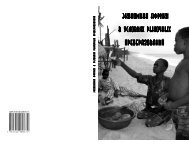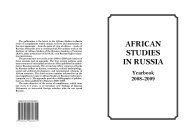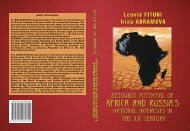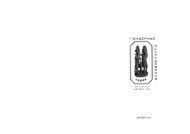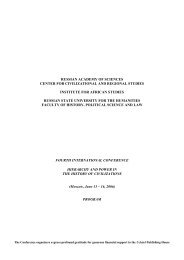Bondarenko Dmitri M. Homoarchy
Bondarenko Dmitri M. Homoarchy
Bondarenko Dmitri M. Homoarchy
Create successful ePaper yourself
Turn your PDF publications into a flip-book with our unique Google optimized e-Paper software.
42<br />
1671: 491; Thomas, N. W. 1910a: I, 91; Ajisafe 1945: 25, 75, 95; Bradbury<br />
1957: 44; Akenzua, S. I. A. 1974: 3; Jones 1983: 40) what was confirmed by<br />
many of his titles, like enonyagbon (“master of the land”) or obayagbon (“the<br />
Oba holds the world”). However, neither all the land nor all the people in the<br />
realm belonged to the sovereign in reality (as some keen European visitors<br />
understood clearly [Nyendael 1705: 430; Smith, W. 1744: 228; Gallwey 1893:<br />
129]). Particularly, the Binis did not know private property in the politicoeconomic<br />
sense, land in their country was held by communities being regarded<br />
as belonging to the ancestors. The Binis were sure in their specific, but not<br />
proprietary, relations with the land: the people and the land were perceived as<br />
in essence non-alienable from each other (Talbot 1926: II, 164, 308; III, 713,<br />
737; Egharevba 1949: 84; for detail, see <strong>Bondarenko</strong> 1995a: 98, 149–152).<br />
According to Kalous’s (1970: 83–84) correct remark, in Benin the very idea of<br />
private land ownership could have looked “absurd”. It did not appear even<br />
under the Europeans’ influence, including the colonial period (Rцmer 1769: 94;<br />
Thomas, N. W. 1910a: I, 91; Ajisafe 1945: 42; Rowling 1948; Bradbury 1957:<br />
44–45; Sidahome 1964: 102–103, 128; Ogbobine 1974: 13–15; Nwankwo<br />
1987: 47–49, 50). The Oba was not a real landholder or furthermore proprietor<br />
even of the plots a part of harvest from which went for his support (Dennett<br />
1910: 199; Egharevba 1949: 77; Ogbobine 1974: 17; Nwankwo 1987: 48).<br />
When an external threat to the country appeared, the Binis used to say: “Truly<br />
this is my father’s land and it does not belong to the Oba alone; then I must do<br />
my utmost to defend my father’s land” (Egharevba 1959: 34). Only war<br />
captives and criminals could be slaves in the proper sociological sense (e.g.,<br />
Ajisafe 1945: 75–76; Egharevba 1949: 65–66).<br />
The title that reflected the part the Binis assigned to their sovereign<br />
most exactly, was obarehiagbon – “Oba is the guard of the world” (Omoruyi<br />
1981: 14). The phrases like “all the land in Benin belongs to the Oba and all<br />
her inhabitants are his slaves” served for expressing the attitude to him as to the<br />
guarantee of the country and populace’s prosperity. This formula also served to<br />
express the idea of all the Benin citizens’ supracommunal unity symbolized and<br />
personalized by the sovereign. Not by chance the notions of “subject” and<br />
“slave” are expressed in the Bini language by one and the same word – ovie<br />
(Bradbury 1973: 181). The name of “the Oba’s slave”, that is to be considered<br />
as his subject, was honorary and only men could have the right to be called so<br />
(Nyendael 1705: 430, 444). As for the idea of the Oba’s omnipotence, it did<br />
not prevent the commoners from recognition as necessary of the separation of<br />
powers between him and titled chiefs, as this idea was rooted in the perception<br />
as completely legal of the division of duties in many local communities<br />
between the sacral “master of the land” (odionwere) and the “profane” ruler<br />
titled onogie that appeared in the early 2 nd millennium (see <strong>Bondarenko</strong> 1995a:<br />
183–194; 1995c; 2001: 55–63 and below, section 4 of this chapter) and thus<br />
preexisted the political system of the Kingdom, as well as the Kingdom as such.



